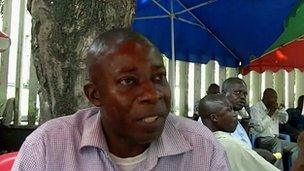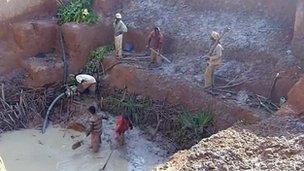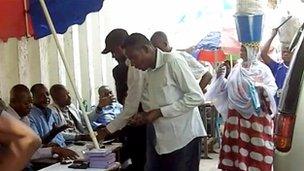My Business: Diamond deals in the Congo
- Published
Gabriel Osombo describes how he set up shop in an open air diamond market in Kinshasa in the Democratic Republic of Congo
<bold>What makes an entrepreneur? The BBC's Thomas Hubert and Tom Santorelli spoke to Gabriel Osombo, a diamond trader in an open-air diamond market in Kinshasa in the Democratic Republic of Congo. </bold>
When Gabriel Osombo realised he would never make ends meet as a civil servant in the Democratic Republic of Congo, he decided to take destiny into his own hands.
It was 2004, and the country was barely emerging from a decade of war.
Teaching, then accounting at the office set up to recover properties stolen under the Mobutu government, had once offered promising careers to Mr Osombo.

Mr Osombo says all he needed to set up shop was an eye for the best quality diamonds and some capital
But those jobs were synonymous with unpaid salaries and hardship.
A native of the mineral-rich Kasai region, he set up shop in Kinshasa's open-air diamond market.
Like him, all the diamond dealers who sit at the plastic tables under trees that line one side street in the Congolese capital's city centre hail from Kasai.
<bold>Security issues</bold>
Their first reaction to a visit by a journalist is cautious, if not downright hostile. The diamond trade is traditionally secretive and the Kasai region is the stronghold of firebrand opposition leader Etienne Tshisekedi, which has led to widespread intimidation against Kasaians. These traders are not looking for publicity.
But after a few visits and assurances that reporting will be strictly business-focused, Mr Osombo and his colleagues finally give a tour of their open-air market.
One thing they are not worried about is security, despite the dozens of diamonds being traded within easy reach of passers-by.
"We have a business association with its own president, vice-president, secretary (that's me) and we have our own security agents on the market. We control everything," Mr Osombo said. "If a suspicious person comes to the market, if we see something is not right, our security agents will stop them and call the police."

Mr Osombo deals in diamonds found in mines such as this one in Kamako in Western Kasai province
<bold>Non-conflict diamonds</bold>
Traders here say they can recognise Congolese diamonds, which are mined outside conflict zones, and refuse stones smuggled from countries like Zimbabwe.
The market registers the identity of all buyers and sellers, something Mr Osombe says ensures traceability and helps keep "blood diamonds" out.
His business fits in a briefcase: diamonds and cash - US dollars only - to conduct transactions, as well as a few light tools, are all he needs for a day's work.
"Each one of us brings his own capital and occupies his own table corner. We buy diamonds and resell them to official export houses. The majority of our buyers are Jewish and Lebanese people who take care of the export side of things," Mr Osombo explains.
DRC legislation reserves the right to diamond trading inside the country to Congolese nationals, with two layers of middlemen involved: some are based close to the mines and buy directly from artisanal diggers, while Kinshasa-based traders like Mr Osombo are closer to the foreign exporters.

All the diamond dealers at the Kinshasa diamond market come from the mineral-rich Kasai region
The foundation of his business is $5,000 in capital, which he rotates between diamonds, shipments of clothes and other Chinese-made goods sent upriver to the mining regions of Kasai, where four people work as his commercial agents. Apart from diamonds, they also send him back agricultural products such as maize and cassava.
Each month, Mr Osombo says his business returns "10-15% of his capital" - $500 to $750, compared with the $150 he earned as a civil servant.
<bold>Middlemen</bold>
Those who don't have a wad of carefully saved banknotes under their mattress to buy and sell their own diamonds offer their services to established traders.
Many men hover around the plastic tables of the Kinshasa diamond market, including Laurent Kaseya, who works as a full-time "coaxer": an agent scouting for good deals on behalf of a big exporting house.
Mr Osombo also receives offers from the likes of Celestin Mutambayi, a freelance "commissioner", who only gets paid if he puts a seller and buyer in contact for a successful sale.
In the past eight years, Mr Osombo's business has allowed him to put his eight children through a good education - four of them are now in university.
His next challenge is to obtain a loan - "a big problem in this country" - which he says would allow him to double the size of his business and move into the formal economy.
"With a capital of $10,000 or $15,000, I could create a small company and pay 10 people a salary," he says.
- Published14 December 2011
- Published21 December 2011
- Published7 December 2011
- Published24 January 2012
- Published17 January 2012
- Published1 February 2012
- Published8 February 2012
- Published15 February 2012
- Published2 May 2012